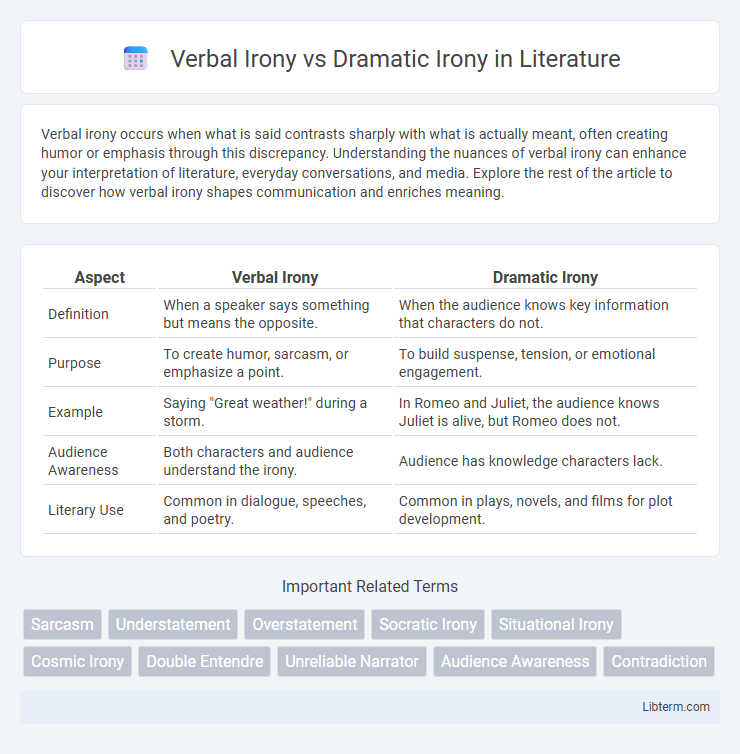Verbal irony occurs when what is said contrasts sharply with what is actually meant, often creating humor or emphasis through this discrepancy. Understanding the nuances of verbal irony can enhance your interpretation of literature, everyday conversations, and media. Explore the rest of the article to discover how verbal irony shapes communication and enriches meaning.
Table of Comparison
| Aspect | Verbal Irony | Dramatic Irony |
|---|---|---|
| Definition | When a speaker says something but means the opposite. | When the audience knows key information that characters do not. |
| Purpose | To create humor, sarcasm, or emphasize a point. | To build suspense, tension, or emotional engagement. |
| Example | Saying "Great weather!" during a storm. | In Romeo and Juliet, the audience knows Juliet is alive, but Romeo does not. |
| Audience Awareness | Both characters and audience understand the irony. | Audience has knowledge characters lack. |
| Literary Use | Common in dialogue, speeches, and poetry. | Common in plays, novels, and films for plot development. |
Understanding Irony: An Overview
Verbal irony occurs when a speaker says something that intentionally contrasts with the literal meaning, often to emphasize a point or create humor. Dramatic irony arises when the audience possesses knowledge that characters within the narrative do not, generating tension or deeper engagement. Understanding these distinctions highlights how irony enhances storytelling by adding complexity and emotional depth to communication.
Defining Verbal Irony
Verbal irony occurs when a speaker says something but means the opposite, often to convey sarcasm or humor. This form of irony relies on tone and context to reveal the contrast between the literal meaning and the intended message. Dramatic irony, by contrast, involves a situation where the audience knows critical information that the characters do not, creating tension or humor.
Defining Dramatic Irony
Dramatic irony occurs when the audience or reader possesses knowledge that characters within the story lack, creating tension and anticipation as characters remain unaware of crucial information. This literary device contrasts with verbal irony, which involves a speaker saying the opposite of what they truly mean. In narratives, dramatic irony enhances engagement by allowing the audience to foresee consequences that characters cannot, thereby deepening the emotional impact.
Key Differences Between Verbal and Dramatic Irony
Verbal irony occurs when a speaker says one thing but means the opposite, often to convey sarcasm or humor, whereas dramatic irony arises when the audience knows critical information that characters do not, creating tension and anticipation. The primary difference lies in their perspectives: verbal irony is based on the speaker's intended meaning versus the literal words, while dramatic irony depends on the audience's awareness exceeding that of the characters. Verbal irony typically enhances dialogue and character expression, while dramatic irony drives plot development and emotional engagement in narratives.
How Verbal Irony Functions in Literature
Verbal irony functions in literature by conveying a meaning opposite to the literal words spoken, often to emphasize a character's true feelings or to inject humor and sarcasm into dialogue. This technique allows authors to create layers of meaning, engaging readers by encouraging them to interpret the contrast between appearance and reality. Unlike dramatic irony, which relies on the audience's superior knowledge, verbal irony depends on the speaker's tone and context to signal the intended subtext.
The Role of Dramatic Irony in Storytelling
Dramatic irony plays a crucial role in storytelling by creating tension and deepening audience engagement through the contrast between a character's understanding and the actual situation known by the audience. Unlike verbal irony, which relies on spoken words with meanings opposite to their literal sense, dramatic irony builds suspense and emotional complexity by allowing viewers to anticipate consequences unknown to characters. This technique is frequently employed in tragedies and thrillers, enhancing narrative depth and character development by highlighting conflicts and impending revelations.
Common Examples of Verbal Irony
Verbal irony occurs when a speaker says something but means the opposite, commonly found in everyday sarcasm, such as saying "Great weather!" during a storm. Examples include classic literary moments like Shakespeare's use in *Julius Caesar*, where Mark Antony's "Brutus is an honorable man" subtly conveys distrust. Dramatic irony differs as the audience knows crucial information unknown to characters, heightening tension in scenes like the looming fate of Oedipus in Sophocles' tragedy.
Notable Examples of Dramatic Irony
Notable examples of dramatic irony appear in Shakespeare's "Romeo and Juliet," where the audience knows Juliet is alive while Romeo believes she is dead, heightening the tragedy. In Sophocles' "Oedipus Rex," dramatic irony unfolds as the audience is aware of Oedipus' true parentage long before he discovers it himself, intensifying the play's tension. Another significant instance occurs in "Macbeth," where the audience understands Macbeth's descent into tyranny, whereas certain characters remain oblivious to his dark intentions.
Effects of Irony on Readers and Audiences
Verbal irony, where speakers say the opposite of what they mean, creates a layer of humor or sarcasm that engages readers by prompting them to discern true intentions, enhancing critical thinking and emotional involvement. Dramatic irony, occurring when the audience knows key information unknown to characters, heightens tension and anticipation, deepening emotional investment through suspense and empathy. Both forms of irony enrich narrative complexity by encouraging active audience interpretation and highlighting thematic contrasts.
Choosing the Right Type of Irony in Writing
Selecting the appropriate irony type enhances narrative impact by aligning with the story's tone and audience engagement. Verbal irony, where a speaker says the opposite of what they mean, works well for humor, sarcasm, or highlighting character traits. Dramatic irony, which occurs when the audience knows key information unknown to characters, builds suspense and deepens emotional connection, making it ideal for thrillers and tragedies.
Verbal Irony Infographic

 libterm.com
libterm.com